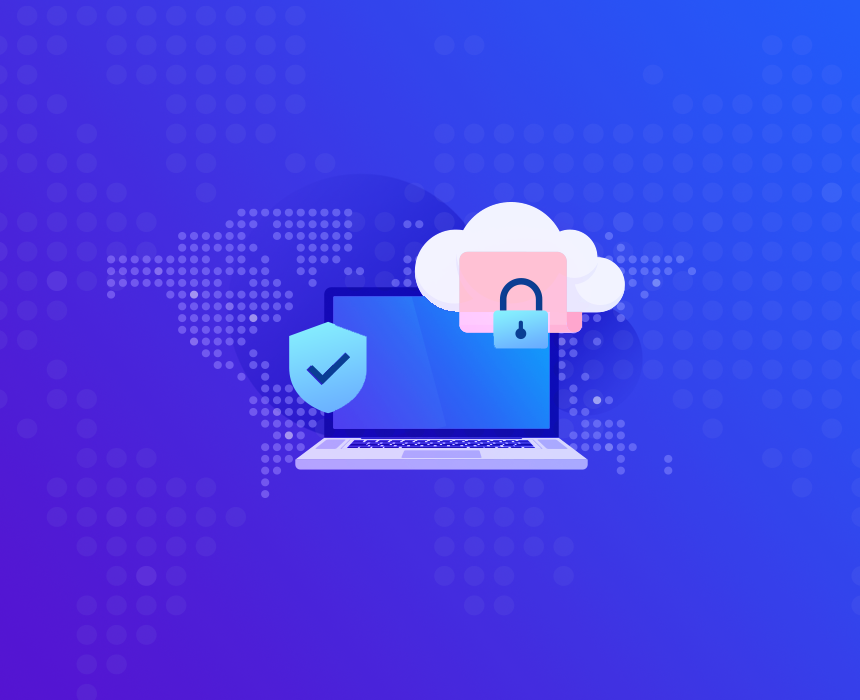
In the rapidly evolving digital world, businesses are increasingly transitioning their data and applications to the cloud. However, with this move comes the heightened risk of cybersecurity threats, necessitating robust measures to safeguard sensitive information. Amidst a plethora of cybersecurity tools, cloud VPN is one of the most powerful solutions to ensure data security. With its ability to effortlessly scale cloud infrastructure and deploy encryption, cloud VPN solutions play a pivotal role in ensuring data protection, privacy, and overall enhanced security. In this piece, we will explore the considerable impact of cloud VPN solutions on cybersecurity and examine how they strengthen data protection protocols. We'll delve into the crucial role they play in enhancing overall security measures and safeguarding sensitive information.
A cloud VPN is a virtual private network set up in the cloud that enables secure online data transfer and communication between networks or devices. By utilizing cloud infrastructure, it replaces conventional on-premises VPN servers and offers scalability, ease of use, and minimal maintenance requirements. Using a VPN client software, users establish encrypted tunnels for data transmission when connecting to the cloud VPN. This permits protected remote access to resources and offers security and privacy. Modern businesses can benefit from cloud VPNs because they are adaptable and enable remote workers to access company resources from any location with an internet connection.
A properly set up cloud VPN allows only authorized users to access this secure data while dissuading unauthorized users from tapping into your data network and resources, thereby making it an ideal network security tool. Let’s learn in detail how cloud VPN can help in enhancing cybersecurity and data protection while offering great flexibility.
At the heart of every VPN lies encryption, and Cloud VPN is no exception. Cloud VPN employs robust encryption protocols to secure data during transmission. When users connect to a Cloud VPN, their internet traffic is encrypted, making it virtually impossible for unauthorized entities to intercept or decipher sensitive information. By using strong encryption algorithms, cloud VPNs ensure that data remains secure and private during transit, adding an extra layer of protection to sensitive data.
One of the primary advantages of Cloud VPN is its scalability. Unlike traditional VPNs that require hardware upgrades to accommodate increasing demands, Cloud VPNs can seamlessly scale to handle a growing number of users and data traffic. Cloud VPN solutions let you deploy servers at locations of your choice based on your requirement, ensuring high availability and optimal performance. This flexibility is particularly advantageous for businesses with expanding operations or those with a geographically dispersed workforce.
Cloud VPN enables secure remote access to internal networks and resources. This helps protect sensitive company data from unauthorized access while employees work remotely or access company resources outside the office, even over unprotected public WiFi networks. The encrypted tunnel established by the cloud VPN ensures that data transmitted between the user's device and the internal network remains secure, reducing the risk of data breaches caused by unsecured connections.
With access logs enabled on a Cloud VPN, administrators can easily monitor network traffic and user sign-ins from a web GUI for signs of malicious activity and block or mitigate potential threats. This intrusion prevention capability helps identify and address security breaches before they escalate into more significant problems, safeguarding sensitive data and resources.
Cloud VPN services often offer web filtering, which blocks malicious websites, reducing the risk of malware infections. Also, administrators can often blacklist networks or domains to fine-tune filtered internet access on the VPN. By providing an additional layer of malware protection, cloud VPNs contribute to the overall cybersecurity posture of businesses, preventing potential cyber threats from infiltrating the network.
Insider threats, where employees with malicious intent exploit their access to sensitive data, can be a significant concern for businesses. Cloud VPN solutions often offer zero-trust-based granular access controls, limiting the data and systems employees can access based on their roles, further reducing the risk of data breaches. By enforcing strict access controls, cloud VPNs help organizations prevent internal security incidents and protect valuable information from unauthorized internal access.
Complying with data protection regulations, such as GDPR (General Data Protection Regulation), is mandatory for businesses dealing with sensitive information. Cloud VPNs aid in meeting these requirements by providing an extra layer of protection for data transmitted to and from cloud services. The encryption and secure data transmission capabilities of cloud VPNs ensure that sensitive data remains protected and that businesses adhere to industry-specific compliance standards.
As technology continues to advance, the importance of cybersecurity and data protection becomes increasingly apparent. Cloud VPN for business offers a powerful solution to meet these challenges head-on, providing robust encryption, flexibility, and scalability. Businesses can leverage Cloud VPN to enhance their cybersecurity posture, safeguard sensitive data, and mitigate potential threats.
UTunnel Secure Access, for instance, offers robust cloud VPN solutions for small and medium businesses to secure their cloud-based resource infrastructure and seamlessly protect them from the hazard of cyber attacks and security threats. By embracing cloud VPN, businesses and individuals alike can confidently navigate the digital landscape while staying one step ahead of cyber threats, ensuring their data remains safe and secure in the cloud.

With the ever-increasing rise in cyberattacks across the globe, cybersecurity has now become a serious concern for businesses of all sizes. Cisco's latest survey, "Big Security in a Small Bu…
04 November 2020
The COVID-19 pandemic has compelled businesses to adapt their traditional practices and adopt work-from-home as a new standard. That increased the need for business VPN solutions, to provi…
11 November 2022